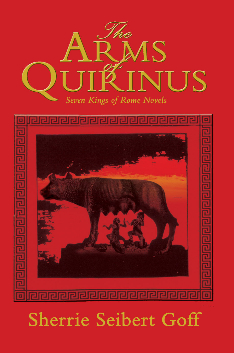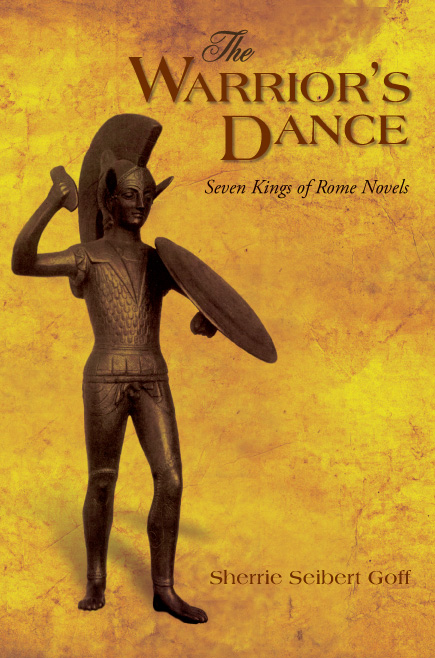***************************************************************
© 2005 by Sherrie Seibert Goff
My father sat out on the garden terrace with his new wife and my uncle, relaxing before supper and watching the water ripple pink in the late-afternoon breeze. With the cool of evening, the chattering of a myriad of birds swelled from the birch and pine trees. It was that time of day when the colors of flowers fade, when the light is such that one cannot distinguish between wolf and dog.
All that day, we had thrilled over the foot and horse races and reveled in merry dancing and wild leaping about gigantic bonfires. We had marveled at the wondrous musicians putting to good use their flutes and lyres, rattles and drums, while young lovers drifted in flower wreathed boats singing and quaffing fine honeyed wine. After our joyful sacrifices at noonday, my foolhardy brother hied off to the woods, and I, still an unripe girl of nine summers, begrudged him his wild exploits and freedom.
As I tucked my new wool tunic beneath my thighs for padding against the unfinished rock, I was startled and thrilled by the eerie howl of a hunting wolf in the distance. Or could it have been the festival games around the fires, lovers or comrades calling, hooting to one another in nearby woods?
My father and his companions seemed not to have heard, but I kissed my holiday charm and made a sign of obeisance to Feronia, the old Sabine wolf goddess. Deep Lake Albano sparkled with reflected torches and the late sun. I kicked off my tight new sandals and gazed out over the jeweled lake across the dark-green treetops towards the somber presence of Mount Albano.
My cousins, decked in wilting lavender wreaths and party garlands, burst through the garden gate. They squealed and giggled, brandishing their toy swords and riding their stick horses. I sucked in my breath as Metius circled my stepmother’s chair and lunged with his wooden short-sword to attack my brother’s prize puppy. The pup yelped in distress, then turned to cavort after the children’s heels.
When a nursemaid came to call the young ones to supper and bed, my heart began to pound. The wind whispered, and the hair of my flesh stood up. I broke off a fragrant sprig of pine and tried to hum that lusty ditty we children had giggled over before our mothers and aunts whisked us away from the revels.
The children were gathering up their little wheeled carts and toy animals, protesting an end to play. As I jumped down from the rock wall, my heart cried out, take heed.
The ground moaned underfoot, and the ridges seemed to stir. As I reached for my sandals, a nimble-footed spirit passed before my face. I halted to listen, trembling in my father’s own garden and staring at the same old two-story redoubt in which I’d been born. Yet the house seemed unfamiliar to me. Strangely distressed, I hurried to catch up with my father, but at the terrace edge something compelled me to turn and gaze once more at Jove’s sacred mountain.
I have since learned to recognize the stirrings of the Goddess in my heart, but just as the roe buck leaves the wolf gasping in the winter wind, that fateful day I was left unable to seize the meaning of the Mother’s warning.
***************************************************************
passage from The Scent of Hyacinth
© 2005 by Sherrie Seibert Goff
I awoke to the song of morning birds and cool shadows, and told myself, I have been here before, but when or how I cannot tell. I know the grass beyond the door, the sweet keen smell, the sound of sparrows brawling in the eaves.
I rolled over on my pallet and stretched. Everyone else was up. Thermantia was sorting out herbs and leaves into little piles, eager for me to instruct her in the making of fasciculi, little tufts of sacred herbs used for a variety of kindly charms. To help sell our wares, I had been teaching her and Chia that the composition of each nosegay varied according to its intended use and that the method of weaving and tying the aromatic clusters was of utmost importance.
I rolled up my pallet and stowed it beneath a bench. “Good morning, Thermantia.”
The old woman turned around and held up two of my finished sheaves. “Do you want me to make pins for these?”
“Nah, those charms are seldom worn. See how the vine securing the dried violets is tied in a bride’s knot? Add a touch of myrtle blossoms, or any herbs sacred to Bona Dea; then it can be hidden beneath a beloved’s pillow or cached secretly near the desired-one’s doorstep. The love knot gives it that subtle power to attract one’s intended lover.”
She cackled and laid the badges down carefully. “Best not let Chia get her hands on these.”
I nodded towards a basket full of little wisps by the door. “Just remember to keep the ones we did yesterday separate from these on the table. Those’re all our protective badges that ward off sickness, fleas, evil eye, theft, and general bad luck.”
Thermantia nodded thoughtfully and raised one eyebrow. “Then these attract, those repel.” She was an apt pupil.
The men were up from their beds and gone. Dava already sat near her rustic loom, carding a great mound of raw wool piled in the laundry vat, ignoring a conversation she couldn’t hear. Thermantia hobbled over to her kitchen box and set about grinding something up in her small hand mill. I went to the corner kitchen gutter and splashed my face in the cold water that flowed from the spring above the house. I shook the water from my hands and began puttering with the sprigs laid out to dry across the oak table. The old woman set about cutting mushrooms and wild celery, and splitting roasted pine nuts for our breakfast. She stirred the sliced mushrooms over a small brazier and sprinkled them with herbs from her pantry nook under the tower-wing stairs.
I said, “All the charms we’ll work on today attract good things like a lover’s affections. To insure success in the hunt, or to bring about a good harvest or even to catch a fish, one need only carry a talisman of plants sacred to the deity involved.”
Thermantia cackled. “And the common folk’ll rely on us to tell ’em what’s sacred to the deity involved?”
‘You scamp.” I straddled the bench and began braiding for some hopeful hunter a fasciculus of dittany, fir and pine.
The old woman kneed another bench close to the crooked table, brought over her plate of mushrooms, celery and nuts, and mixed two small cups of sour wine.
***************************************************************
passage from The Warrior’s Dance
© 2008 by Sherrie Seibert Goff
Timius’ grandmother had a quaint custom of marking each day as good or bad by dropping a white or black stone in an urn. Each night the elegant matron lingered at her household shrine to select a pebble of the right hue, white being the symbol of happiness and black that of misfortune or trouble. At the turning of the seasons or on family anniversaries, Grandma Fannia could dump out her cache of burnished pebbles and reflect back upon her life.
Thinking to confirm that the balance had tipped in young Timius’ prospects for survival, I tiptoed across my neighbor’s deserted hall and stole a peek inside that red, white, and black goddess urn. Its innards gleamed ominously dark. The scent of fragrant wood and resins hovered about the shrine. Startled by a soft noise, I clanked down the lid and spun around to find Timius’ sister Horatia leaning against the door post and regarding me with a wry grin.
I had intended to slip in for a word with Timius before joining his brothers on the cavalry grounds, not come calling on the house. Now here I was, a wellborn lad, spotted wearing some sweat stained, faded brown tunic that reeked of the stables, along with dusty worn boots and a strip of ragged wool tied around my patrician head.
Flustered and annoyed at the girl’s catching me peeking in someone’s private jar, I decided to tweak her a little. “What say you we switch around your old gran’s rocks and make her think she’s had a good time this month?”
***************************************************************
passage from The Tiber Bridge .
© 2010 by Sherrie Seibert Goff
Larth Mamurke, dressed in his fancy red sandals and Etruscan finery, shouted, “By all the Gods!” and rushed down upon my blameless flock, throwing stones, intent on hurting their tender legs and noses. He yelled, “Thezi! Get those sheep out of here! Have you no respect?”
I scrambled up the slope and tripped across a gnarled root of a tall cypress. “Stop, Sir! I shall move them.” He flung a pebble at me too and stormed away muttering about filthy peasants.
I whistled sharply to roust my poor beasts, but they were stubborn and did not want to leave, for the grasses grew long and green in the shade of the tombs in the necropolis. The sheep bawled in protest and snatched quickly at the good graze to swallow whole and ruminate over later. I noticed one of my young goats limping. Larth Mamurke had driven him to jump off the grassy tumulus that covers the mounded roof of one of the tombs. Goats are browsers that eat up not down, so naturally he had climbed to where he ought not have been to reach tender fronds of the laurel and myrtle trees shading the tombs.
The injured animal scampered down the slope after the others, holding up a hurt hind leg. I cursed rich men and their ilk and caught up to the young buck to probe his bony leg for a break. The smelly goat struggled at my prodding, and I noticed that his hooves needed some trimming to stave off foot rot. His injury seemed little more than a painful bruise or sprain, so I picked him up and called softly to his fellow critters to follow me.
I needed only to whistle a little traveling tune as I marched along at the head of my mixed flock of sheep and goats for them to trail me back to the fold or out to fresh pastures. My proud grandfather had taught me my shepherd ways, as there is much to know about the tending and guarding of sheep. My grandsire boasted that in his native Etruria a skilled shepherd leads his flock rather than driving them as done in Greece. The old man was forever critical of Greek and foreign influences in our town, even to the point of naming the Greek sailors and tradesmen who swarmed the nearby port as dishonest and tricky to a one.
I took my own notions from my more world-wise father, who had served on a Tyrrhenian trade ship and helped build the port at Pyrgi. I had long ago marked my father as a wiser man who stifled a smile and quietly tolerated my grandfather’s complaints about foreign persons. That day, my father, Vel Prasanai, looked up from his work in the field and spied me shutting my sheep and goats in the wicker pen to check them for bruises. He wiped the dusty sweat from his forehead and left his rake to come investigate.
My stern grandfather hobbled out to the animal pen as well, shading his eyes and scowling like a demon. My stomach tensed in readiness for his sharp tongue. Grandfather’s heavily furrowed, weather-beaten face showed the effects of fifty years toiling under the sun. He cursed under his breath. “I told you to pour apple cider vinegar in their water. Bad feed makes them colicky.”
“I found a mulberry bush yesterday, Grandpa. Acidic berry leaves are good for colic. Plus they got some excellent grasses today.”
The grand old man of rural Etruria scowled at my brown-faced goat that stood still near the side of the pen gingerly favoring its hind leg. His piercing dark eyes looked hard as flint. “Have you been sleeping on the watch again, Thezi?”
As I fetched the cider jug from the shed and seasoned the animals’ water trough, I told my story of how Larth had driven the young goat to his injury, and tried to turn blame from myself by complaining: “He could have asked me politely to remove them. He is a cruel man.”
My father agreed with me. “You may have deserved a pebble flung at your butt, Thezi, but mistreatment of blameless animals is downright cowardly.”
My mother, Cilens Prasanai, laid a hand on his arm and explained, “Larth Mamurke is in mourning, Vel. We must overlook his temper today.” She beckoned us over to the shade of the house. “We shall eat early, since you’re all here.” Mother signaled my sister to stir up the charcoal embers and gave me a stern look.
I followed her to the cook fire and watched her open her bags of barley and leeks for the pot. She clucked her tongue and grumbled. “Why must you trespass into the people’s cemetery asking for trouble, son?”
“I am sorry, Mother. As the summer gets hotter, I have to take our animals higher on the mountain or farther down the dangerous river ravine to find any good graze at all. The other morning, I was wandering along with my sheep looking for a new way up the hillside and noticed all the excellent grasses growing up around the big tombs just going to waste. My animals sort of sought out the rich green shoots on their own, so I lingered awhile out of mercy for them.”
Her eyes widened in dismay, and I protested quickly, “I always take care to keep my distance from tomb painters or funerals, Mother. When Larth Mamurke’s father died, I watched from the hillside as rich mourners brought fancy gifts to a funeral feast at the family tomb. I admit I left my flock and stole down for a closer look, but Larth’s servant saw me gawking at the holy doings and gave me a mean look, so I headed off my sheep and led them high up the mountain out of respect. I have been careful ever since.”
Father remarked, “Then how’d you get caught, smart boy?”
I shrugged in chagrin. “It’s been days since the funeral. I thought the place deserted, but got a rude surprise when Larth Mamurke came up out of his family tomb carrying a large gold fibula in one hand and holding a ring or something up to the sunlight to examine. He seemed furious at the mere sight of me and vented his ire on my weak animals.” I scratched my neck and mused, “His tantrum was so odd, you’d think he’d been caught robbing funeral gifts from his father’s tomb, or something.”
My father’s eyes sparked with interest. “He was there alone?”
“Just him and a pack mule tied in the side lane out of sight.”
My father chuckled at the notion, but my mother hissed. “Whatever he was doing is none of our concern, Vel. If he was up to no good, no wonder he was furious at Thezi. We must get along with the noblemen of the town and stay beneath their notice, else we shall suffer for it.” She squeezed my collar bone. “Do not go there again, do you hear me? And do not repeat what you just said about Larth Mamurke to anyone.” The alarm in her voice caught my full attention, and I nodded in sober agreement.
Grandpa fetched the wine jug from the house and followed my father over to the cook fire. “My daughter is right, Vel. We must stay clear of Larth Mamurke. He was always a spoiled son. I enjoyed good regard from his father for whom I did a good deed once, and the nobleman was always fair and openhanded in return, even used to send us a jug of fancy vintage for harvest festival. But his son is haughty. Maybe we will go to see young Larth and pay our respects and condolences after his grief eases a bit. Until then, stay out of his way, Thezi.”
I could not help muttering with resentment, “I for one shall not pay him any respects.” Our sturdy farm hut was no better or worse than the peasant houses bunched together in the nearby village, but it differed hugely from the grand homes within the walls of Caere, so I could not help thinking that the Mamurke family had no wish to receive condolences from the likes of us.
***************************************************************




